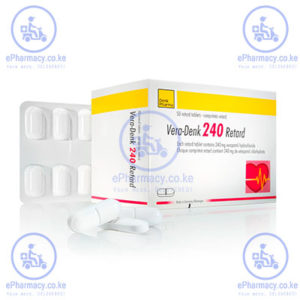Description
Verapamil is a calcium-channel blocker and a class IV antiarrhythmic. Verapamil slows conduction through the AV node, and thus slows the increased ventricular response rate that occurs in atrial fibrillation and flutter. A decrease in both coronary and peripheral vascular resistance together with a sparing effect on myocardial intracellular oxygen consumption appear to be the modes of action in angina. The decrease in peripheral vascular resistance may explain the antihypertensive effect of verapamil.
Verapamil, ISOPTIN may be given intravenously in Kenya or by mouth as the hydrochloride for the control of supraventricular arrhythmias. Intravenous injections should be given under continuous ECG monitoring. When given intravenously a dose of 5 to 10 mg is injected over a period of 2 to 3 minutes; if necessary, a further 5 mg may be injected 5 to 10 minutes after the first. In the USA a second dose of 10 mg given after 30 minutes if required is suggested. Children should be treated with great care; intravenous doses given over at least 2 minutes are: up to 1 year of age, 100 to 200 micrograms/kg; age 1 to 15 years, 100 to 300 micrograms/kg (to a maximum dose of 5 mg). The dose may be repeated after 30 minutes if necessary. Doses at the lower end of the range may be adequate and the injection should be stopped when a response has been obtained.
Oral doses for the treatment of supraventricular arrhythmias are 120 to 480 mg daily in 3 or 4 divided doses, according to the severity of the condition and the patient’s response. Oral doses for children are: up to 2 years of age, 20 mg two or three times daily; 2 years and over, 40 to 120 mg two or three times daily according to age and response; great care is still required.
In the management of angina pectoris in Kenya, verapamil hydrochloride/ISOPTIN is given by mouth in doses of 120 mg three times daily; some patients with angina of effort may respond to 80 mg three times daily, but this lower dose is not likely to be effective in angina at rest or Prinzmetal’s variant angina. Modified-release preparations may be given in doses of up to 480 mg daily.
In hypertension the dose of verapamil hydrochloride is generally 160 mg twice daily by mouth with a range of ISOPTIN 240 mg to 480 mg daily. Modified-release preparations may be given in similar daily doses. A dose of up to 10 mg/kg daily in divided doses may be used for children.
In the management of myocardial infarction in Kenya, verapamil hydrochloride, as a modified-release oral preparation, may be started at least 1 week after acute infarction (in patients without heart failure) in a dose of 360 mg daily in divided doses.
Doses of verapamil should be reduced in patients with hepatic impairment
Breast feeding.
Verapamil concentrations in breast milk similar to those found in plasma have been reported in a woman taking verapamil 80 mg four times daily. The maximum concentration measured in breast milk was 300 nanograms/mL. However, the average concentration in milk in another woman taking 80 mg three times daily was 23% of that in serum. The serum concentration of verapamil in the breast-fed child was 2.1 nanograms/mL during treatment and undetectable 38 hours after the last maternal dose. In another patient3 taking the same dose, the average steady-state concentrations of ISOPTIN verapamil and norverapamil in milk were, respectively, 60% and 16% of the concentration in plasma, with the ratio between milk and plasma varying during a dosage interval. It was estimated that the infant received less than 0.01% of the mother’s dose, and no verapamil or norverapamil could be detected in the plasma of the infant. No adverse effects have been seen in breast-feeding infants, and the American Academy of Pediatrics considers that verapamil is therefore usually compatible with breast feeding.
Precautions
Verapamil is contra-indicated in hypotension, in cardiogenic shock, in marked bradycardia, in second- or third-degree AV block, and in uncompensated heart failure. It is also contra-indicated in the sick-sinus syndrome unless a pacemaker is fitted. There is an increased incidence of adverse cardiac effects in patients with hypertrophic cardiomyopathy. In patients with atrial flutter or fibrillation and an accessory pathway with anterograde conduction, for example Wolff-Parkinson-White syndrome, verapamil may induce severe ventricular tachycardia and some authorities contra-indicate its use in such patients.
Special care is required in using verapamil as an antiarrhythmic in infants as they may be more susceptible to verapamil-induced arrhythmias.
Doses of verapamil should be reduced in patients with hepatic impairment.
Sudden withdrawal of verapamil might be associated with exacerbation of angina.
Adverse Effects
Treatment with verapamil is generally well tolerated, but adverse effects connected with its pharmacological effects on cardiac conduction can arise and may be particularly severe in patients with hypertrophic cardiomyopathies. Adverse effects on the heart include bradycardia, AV block, worsening heart failure, and transient asystole. These effects are more common with parenteral than with oral therapy.
The most troublesome non-cardiac adverse effect is constipation. Nausea may occur but is less frequently reported. Other adverse effects include hypotension, dizziness, flushing, headaches, fatigue, dyspnoea, and peripheral oedema. There have been reports of skin reactions and some cases of abnormal liver function and hepatotoxicity. Gingival hyperplasia has occurred. Gynaecomastia has been reported rarely.
In overdosage there may be severe cardiotoxicity and profound hypotension.



Reviews
There are no reviews yet.